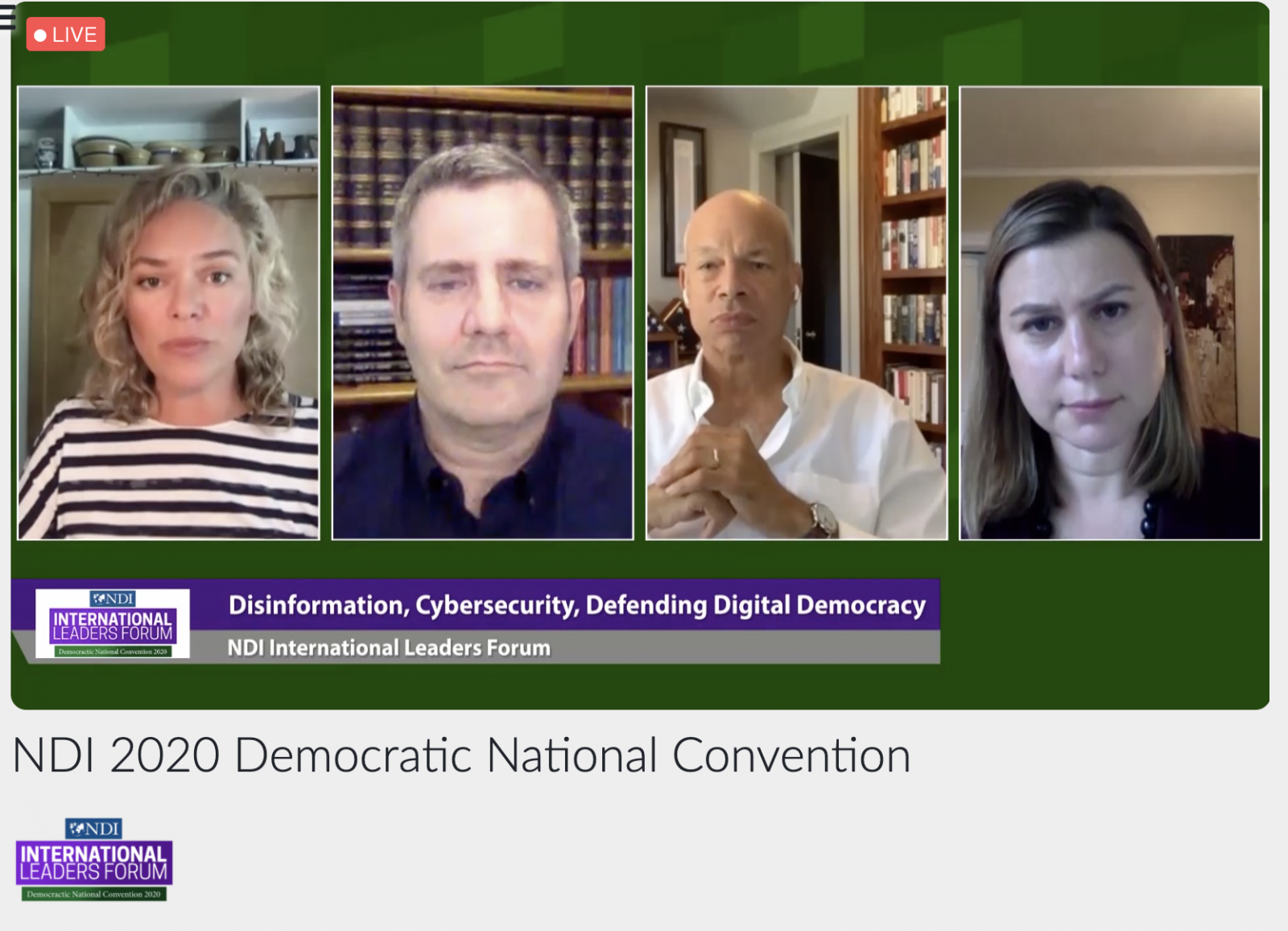
SHARE
ISSUES
Authoritarian actors threaten to undermine democratic ideals around the world. That’s why this month, NDI featured a conversation among incredible leaders to discuss Disinformation, Cybersecurity, and Defending Digital Democracy as part of the International Leaders Forum held on the sidelines of the Democratic National Convention (and this year held virtually.)
In a wide ranging discussion, one common theme emerged. We know what works: the strongest counter to disinformation is good governance and trust in institutions.
NDI has been at the forefront of technology--and how it is transforming how we engage in public discourse--for more than two decades. Along the way, NDI has developed partnerships with experts and industry leaders including Katherine Maher, CEO and Executive Director of Wikimedia Foundation and Brad Smith, CEO of Microsoft. They kicked off the discussion of Microsoft’s Defending Democracy Program pillars: protecting political campaigns from hacking, preserving the electoral process, and defending against disinformation.
“We’ve done a lot in the last four years to harden our defenses, but the threats are becoming more sophisticated as well. And we have an enormous amount of work to do...for the rest of our lives to protect democracy from these kinds of attacks” said Smith. Smith developed the idea of Digital Geneva Convention that encourages work across sectors to create global and legally binding solutions.
Maher pointed out that this like other similar efforts to create norms and standards are critical because it demonstrates the importance of “building trust through transparency and process, not just outcomes.”
Securing and ensuring the resilience of the democratic process and countering disinformation is a critical mission for NDI, with more than 30 programs around the world. Our flagship effort, INFO/tegrity, assists partners in monitoring the online environment during elections, and trains key stakeholders such as parties, policymakers, civil society groups and others on foundational cybersecurity and information integrity concepts.
The approach of multistakeholder collaboration to build trust is also reflected in the work of the Design 4 Democracy Coalition which ensures that information technology and social media play a proactive role in supporting democracy and human rights globally through a sustained dialogue among civil society, non-governmental organizations and technology companies.
The discussion continued as Maher engaged Congresswoman Elissa Slotkin; Jeh Johnson, former Secretary of Homeland Security; and Philip Howard of the Oxford Internet Institute.
Howard’s extensive efforts to identify and mitigate disinformation has been honored by NDI and he stressed the importance that the very definition of disinformation continues to evolve, such as disinformation about COVID-19. “The content that undermines our confidence in having a good civil conversation, that’s what’s really dangerous here,” said Howard.
“The public is entitled to have confidence in our government,” stressed Johnson, whose efforts to designate election infrastructure as critical infrastructure in 2016, paved the way for many efforts to improve US cyber resilience. Representative Slotkin pointed out that despite these efforts, the United States has not changed a single law to address foreign propaganda.
Slotkin called upon legislatures around the world to realize the benefit of younger members with technology and national security backgrounds as a means of building confidence in legislative actions.
The remarks of these leaders reflect what NDI’s own research shows: democratic governance is the best treatment for an infodemic. In Georgia, where citizens credit the government and public health authorities with an effective response to the virus, 85 percent say they fully or partially trust information on this topic coming from the government, and turn to the government for reliable data and guidance. In addition, most accurately identified as false some of the prevalent covid-related disinformation narratives. By building public trust in its performance, the Georgian government has also reinforced public resilience to disinformation. The same dynamic is reflected in Taiwan where civil society and trusted government actors successfully countered disinformation through social media aimed at building trust through facts.
Creating a digital information environment in which democracy thrives is critical, but will be achieved only through sustained conversation among governments, civil society, and technology companies. This effort will remain central to NDI’s work.
Democracies are under threat, but we have learned through evidence and experience that building trust through sustained cooperation is as important as fact checking and take downs. As Representative Slotkin stated, “We’ve got to be united on intent.”
Author: Moira Whelan is the Director for Democracy and Technology at NDI.


